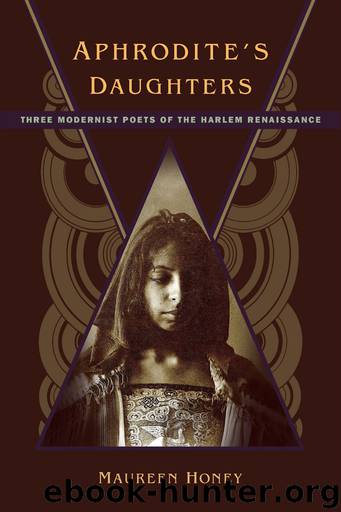Aphrodite's Daughters by Honey Maureen;

Author:Honey, Maureen; [Honey, Maureen]
Language: eng
Format: epub
Publisher: Rutgers University Press
Published: 2016-06-02T00:00:00+00:00
FIGURE 13. Gwendolyn Bennett at a Harlem Community Arts Center benefit at the Savoy Ballroom on May 24, 1939. Bennett is third from right. Photo © Morgan and Marvin Smith. Photographs and Prints Division, Schomburg Center for Research in Black Culture, The New York Public Library, Astor, Lenox and Tilden Foundations.
As late as December 31, 1938, however, Bennett’s unpublished poetry reflects continuing torment over her inability to form a lasting relationship, an issue she told Sandra Govan in 1979 severely impacted her. Saying she was “trapped in a very unhappy marriage for eight long years,” Bennett added: “Marriage has played a very great part in my life. You can’t underestimate the fact of marriage, the need to have a successful marriage played in my life.”132 She channeled this yearning for intimacy into poetry that may not have been meant for publication, given how little of the unpublished work was evidently sent out. The bitter “New Year’s Eve—1938” comes at the nadir of this period as its speaker bids a fond farewell to the “bastard year”:
Year that gave me love,
A draught of vinegar
Upon the crucifixion nails;
Year that gave me hope,
A bitter wormwood
At the macabre feasting-board.
“I bid you farewell,” the speaker exults,
Full knowing you will come again,
And over again,
To pick the flesh anew
From the healing sore
Of each new day.133
Bennett wrote a note at the end of this poem relaying she did not receive a telegram informing her that an anticipated date could not make it, someone with whom she was planning to spend “a lovely New Year’s Eve,” so she sat waiting until 2 A.M. “not knowing what to think and feeling thoroughly miserable.” As the clock struck midnight and her radio broadcast toasted the New Year, she wrote, “I said out loud bitterly, ‘Farewell, you bastard year’—and then wrote the poem.”
Rebirth of Joy and Return to the Spirit Within
Reflecting Bennett’s resilience in the face of self-doubt, moments of despair, and an inability to believe that lasting love would ever materialize, however, is a group of the unpublished poems that feature speakers closer to the shy idealist of her younger work, who feels a sense of comfort, beauty, and peace from someone who speaks to her with a tenderness that allows her to soften. Three of these use imagery associated with Aphrodite in classic representations of her as a goddess of the sea attended by birds and surrounded by flowers. In “Fulfillment,” the speaker locates herself on the seashore:
To be with you is to know peace again,
And the deep understanding of things.
The height of sky and depth of sea
Are become simple and plain.
[. . .]
With you I am fulfilled,
And made alive to all the pulsing things of earth.
No quickest wind nor swiftly rising tide
Can shake the deep peace of my understanding;
Nor quickened moment disturb the height and depth
Of my fulfillment.134
An untitled piece that similarly alludes to a reawakened Aphrodite features a speaker who looks to her beloved for help in healing from a painful past:
Give me your hand, beloved,
That I may walk safely
Through the broken stubble
Of the long forgotten years.
Download
This site does not store any files on its server. We only index and link to content provided by other sites. Please contact the content providers to delete copyright contents if any and email us, we'll remove relevant links or contents immediately.
| African | Asian |
| Australian & Oceanian | Canadian |
| Caribbean & Latin American | European |
| Jewish | Middle Eastern |
| Russian | United States |
4 3 2 1: A Novel by Paul Auster(11032)
The handmaid's tale by Margaret Atwood(6836)
Giovanni's Room by James Baldwin(5870)
Big Magic: Creative Living Beyond Fear by Elizabeth Gilbert(4716)
Asking the Right Questions: A Guide to Critical Thinking by M. Neil Browne & Stuart M. Keeley(4563)
On Writing A Memoir of the Craft by Stephen King(4204)
Ego Is the Enemy by Ryan Holiday(3982)
Ken Follett - World without end by Ken Follett(3968)
The Body: A Guide for Occupants by Bill Bryson(3788)
Bluets by Maggie Nelson(3704)
Adulting by Kelly Williams Brown(3662)
Guilty Pleasures by Laurell K Hamilton(3578)
Eat That Frog! by Brian Tracy(3505)
White Noise - A Novel by Don DeLillo(3429)
The Poetry of Pablo Neruda by Pablo Neruda(3358)
Alive: The Story of the Andes Survivors by Piers Paul Read(3300)
The Bookshop by Penelope Fitzgerald(3220)
The Book of Joy by Dalai Lama(3212)
Fingerprints of the Gods by Graham Hancock(3206)
